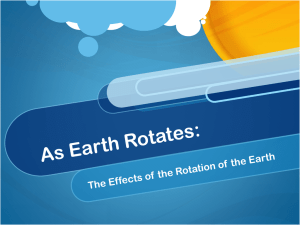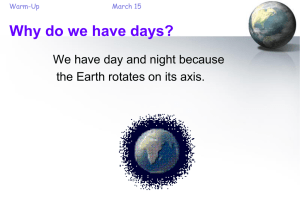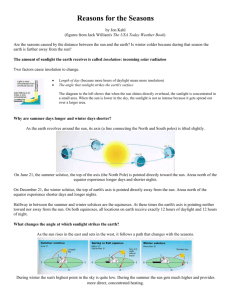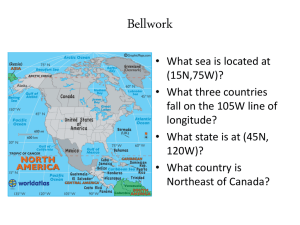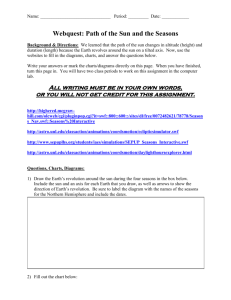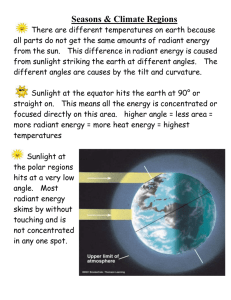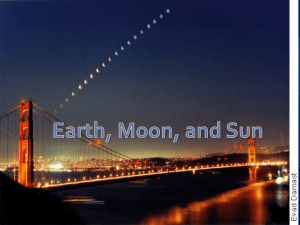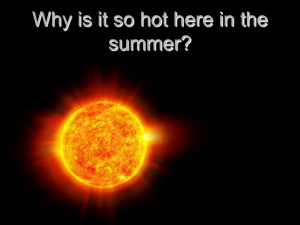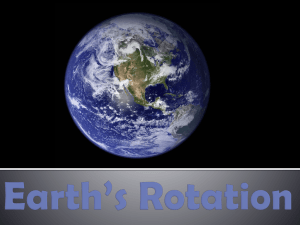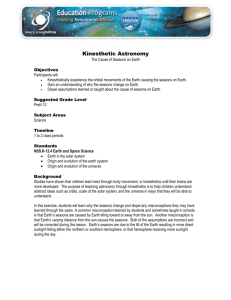Differences in Length of Day…
advertisement
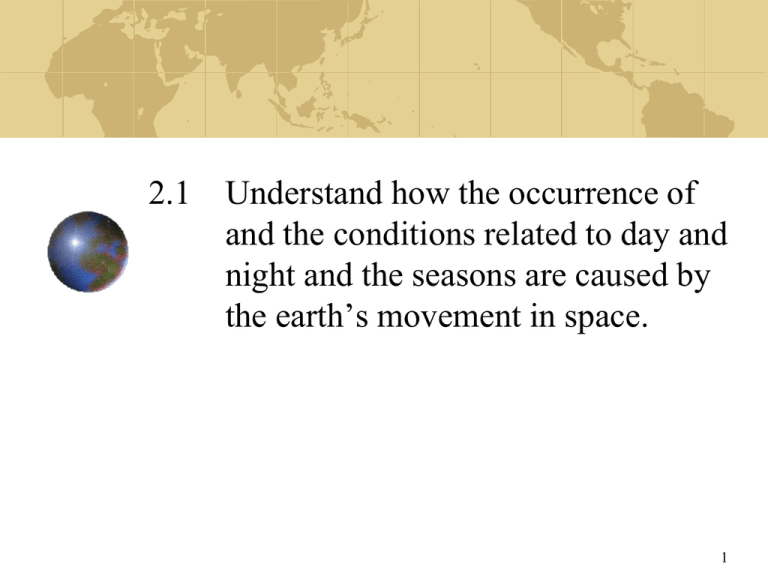
2.1 Understand how the occurrence of and the conditions related to day and night and the seasons are caused by the earth’s movement in space. 1 2.1.1 Distinguish between the terms rotation and revolution. Rotation: • The earth spins on its own axis. • The earth rotates 360 degrees, or one complete rotation, on its own axis in one day. • The earth rotates from west to east, in a counterclockwise motion. 2 Revolution: • The earth circles the sun. • It takes the earth 365.25 days to orbit the sun. • The earth travels in a counterclockwise direction around the sun. 3 Earth’s Revolution: 4 In Summary: 5 Video Earth’s Rotation: http://www.youtube.com/watch?v=CEe 8vzJjj3M 6 Animation: Earth’s Revolution 7 2.1.2 Explain how cloud cover influences the range of temperature from day to night. • Nightly cloud cover reduces the range of temperature from day to night. • Clouds reflect heat waves • Heat below clouds is reflected back to earth. • Without clouds heat escapes, giving colder nights 8 2.1.3 1. 2. 3. 4. Define the terms Equinox & Solstice Solstice: Occurs Dec 21 & June 21 Longest amount of daylight/dark in the year! Sun is directly over head @ 12 noon on 23.5o North or South. From Latin for sun stand still 1. 2. 3. 4. Equinox: Occurs Sept. 21 & March 21 Equal length of daylight AND dark everywhere on earth! Sun is directly over head @ 12 noon on the equator. From Latin for equal day & night. 9 2.1.3 Define the terms Equinox & Solstice Equinox Solstice Adapted from “World Geography” p. 56 Solstice Equinox 10 2.1.4 Changes in Seasons Relate to Earth’s Revolution around the Sun 11 Describe how the Seasons are related to the Earth’s Revolution around the Sun Seasons are directly related to the earth’s revolution around the sun Because of the tilt, different places receive different lengths of day and night 12 The tilt in the earth cause sunlight to hit the earth at different angles When the sun is directly overhead, the sun’s rays are more intense As the earth revolves around the sun; 1. the length of day changes 2. the intensity of the sun’s rays change 13 2.1.4 As seasons change, so does the amount of direct sunlight 14 The length of day and intensity of sunlight changes gradually as each hemisphere leans toward or away from the sun. The seasons are characterized by gradual transitions, as each hemisphere receives more or less sunlight 15 Check for Understanding! Chapter 4 Read pages 55-57 Do questions on page 55: #’s 6, 7, 8 and 9 16 The Earth in its Revolution around the Sun! 2.1.4 •September 21st •North is in Fall •12 hrs day & 12 hrs night •Noon Sun 900 @ Equator •Dec 21st •South is in Spring •North is in Winter •June 21st •Less sun hours •North is in Summer •Less direct sun •More sun hours •South is in Summer •More direct sun •More sun hours •Noon Sun 900 @ Tropic of Cancer •More direct sun •Noon Sun 900 @ Tropic of Capricorn •South is in Winter •March 21st •Less sun hours •North is in Spring •Less direct sun •12 hrs day & 12 hrs night •Noon Sun 900 @ Equator •South is in Fall 17 2.1.5 Differences in Length of day as Seasons Change. The tilt of the earth’s axis, plus the earth’s rotation in orbit around the sun, gives the earth different lengths of daylight! The pole pointed towards the sun receives more hours of exposure to the sun. This feature gives this hemisphere longer days. 18 Differences in Length of Day…June In June, because of the tilt on the earth's axis, the north pole points towards the sun. It receives more hours of exposure to the sunlight hence giving it longer days. June Solstice 19 Differences in Length of Day…June Northern hemisphere only rotates out of the sunlight for a short period each day i.e. Daylight at 5:30 am and dark at 10:00 pm June Solstice 20 Differences in Length of Day…December In December, because of the tilt on the earth's axis, the north pole points away from the sun. It receives fewer hours of exposure to the sun hence giving it shorter days. December Solstice 21 Differences in Length of Day…December Northern hemisphere rotates out of the sunlight for a long period each day i.e. Daylight at 8:30 am and dark at 4:30 pm December Solstice 22 Differences in Length of Day…equinoxes (Mar 21 & Sept 21) On March 21 and September 21, because of the tilt on the earth's axis, all parts of the earth receive equal amounts of sunlight. Day and night are of the same length. March 21 and Sept 21 23 2.1.6 Differences in Temperature as Seasons Change. Two factors: 1. Longer summer daylight hours means there are more heating hours and fewer cooling hours. 2. More direct sunlight gives greater intensity of heat! 24 2.1.6 Common Misconception! Misconception : The difference in summer and winter is due to the earth getting closer or further from the sun. Actually we are further from the sun in our summer! The difference in summer and winter is due to the tilt of the earth on its axis! 25 Remember! The earth’s rotation in orbit around the sun accompanied by the tilt of the earth on its axis, gives the earth different day lengths, differences in temperatures, and ultimately different seasons! The pole pointed towards the sun receives more hours of exposure to the sun. This tilting gives the pole pointed toward the sun longer days and warmer temperatures. 26
